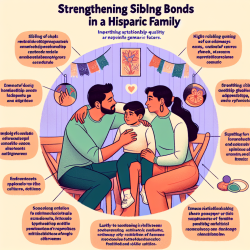Siblings often share a unique bond that can significantly influence their development and well-being. For practitioners working with Latinx families, understanding the cultural nuances that shape sibling relationships is crucial. A recent systematic review titled "Exploring Sibling Relationship Quality among Latinx Siblings: A Systematic Review" provides valuable insights into these dynamics.
The Role of Cultural Values
The review highlights the importance of cultural values such as familism and simpatía in shaping sibling relationships within Latinx families. Familism emphasizes family support, responsibilities, and interdependence, fostering intimacy and warmth among siblings. Simpatía promotes smooth social interactions and conflict avoidance, contributing to a nurturing environment.
Practitioners can leverage these insights by encouraging families to embrace these values in everyday interactions. For instance, promoting activities that involve family participation can strengthen bonds and reinforce the importance of family cohesion.
Gender Dynamics in Sibling Relationships
The research also sheds light on how gender roles influence sibling dynamics. Traditional roles like machismo and marianismo can shape expectations and behaviors, affecting how siblings interact and support each other. Understanding these dynamics is essential for practitioners aiming to foster positive sibling relationships.
Encouraging open discussions about gender roles within families can help siblings navigate these expectations more effectively. Practitioners might also consider integrating gender-sensitive approaches into their interventions to address these dynamics.
Culturally Sensitive Approaches
The findings underscore the need for culturally sensitive approaches when studying sibling relationships. By tailoring interventions to align with cultural values and norms, practitioners can enhance their effectiveness. This involves not only understanding the cultural context but also actively involving families in the design of interventions.
Culturally responsive programs like the "Siblings are Special" initiative have shown promise in strengthening sibling bonds by aligning with Latino cultural values. Such programs emphasize close family relationships and have been well-received by participating families.
The Need for Further Research
While the review provides valuable insights, it also highlights gaps in the literature, particularly regarding diverse Latinx subgroups beyond Mexican-Americans. Future research should aim to explore sibling dynamics across various cultural contexts to develop a more comprehensive understanding.
Practitioners are encouraged to engage in ongoing research efforts to expand knowledge in this area. By doing so, they can contribute to developing more effective strategies for supporting sibling relationships in diverse family settings.
Conclusion
Siblings play a crucial role in shaping individual development and well-being. By understanding the cultural factors influencing these relationships within Latinx families, practitioners can better support positive sibling interactions. Embracing culturally sensitive practices and encouraging further research will enhance our ability to foster strong sibling bonds in diverse communities.










